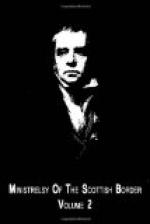A LYKE-WAKE DIRGE.
This is a sort of charm, sung by the lower ranks of Roman Catholics, in some parts of the north of England, while watching a dead body, previous to interment. The tune is doleful and monotonous, and, joined to the mysterious import of the words, has a solemn effect. The word sleet, in the chorus, seems to be corrupted from selt, or salt; a quantity of which, in compliance with a popular superstition, is frequently placed on the breast of a corpse.
The mythologic ideas of the dirge are common to various creeds. The Mahometan believes, that, in advancing to the final judgment seat, he must traverse a bar of red-hot iron, stretched across a bottomless gulph. The good works of each true believer, assuming a substantial form, will then interpose betwixt his feet and this "Bridge of Dread;" but the wicked, having no such protection, must fall headlong into the abyss.—D’HERBELOT, Bibiotheque Orientale.
Passages, similar to this dirge, are also to be found in Lady Culross’s Dream, as quoted in the second Dissertation prefixed by Mr Pinkerton to his Select Scottish Ballads, 2 vols. The dreamer journeys towards heaven, accompanied and assisted by a celestial guide:
Through dreadful dens, which made my heart
aghast,
He bare me up when I began to tire.
Sometimes we clamb o’er craggy mountains
high.
And sometimes stay’d on uglie braes
of sand:
They were so stay that wonder was to see;
But, when I fear’d, he held me by
the hand.
Through great deserts we wandered on our
way—
Forward we passed on narrow bridge of
trie,
O’er waters great, which hediously
did roar.
Again, she supposes herself suspended over an infernal gulph:
Ere I was ware, one gripped me at the
last,
And held me high above a naming fire.
The fire was great; the heat did pierce
me sore;
My faith grew weak.; my grip was very
small;
I trembled fast; my fear grew more and
more.
A horrible picture of the same kind, dictated probably by the author’s unhappy state of mind, is to be found in Brooke’s Fool of Quality. The dreamer, a ruined female, is suspended over the gulph of perdition by a single hair, which is severed by a demon, who, in the form of her seducer springs upwards from the flames.
The Russian funeral service, without any allegorical imagery, expresses the sentiment of the dirge in language alike simple and noble.
“Hast thou pitied the afflicted, O man? In death shalt thou be pitied. Hast thou consoled the orphan? The orphan will deliver thee. Hast thou clothed the naked? The naked will procure thee protection.”—RICHARDSON’S Anecdotes of Russia.
But the most minute description of the Brig o’ Dread, occurs in the legend of Sir Owain, No. XL. in the MS. Collection of Romances, W. 4.1. Advocates’ Library, Edinburgh; though its position is not the same as in the dirge, which may excite a suspicion that the order of the stanzas in the latter has been transposed. Sir Owain, a Northumbrian knight, after many frightful adventures in St Patrick’s purgatory, at last arrives at the bridge, which, in the legend, is placed betwixt purgatory and paradise:




